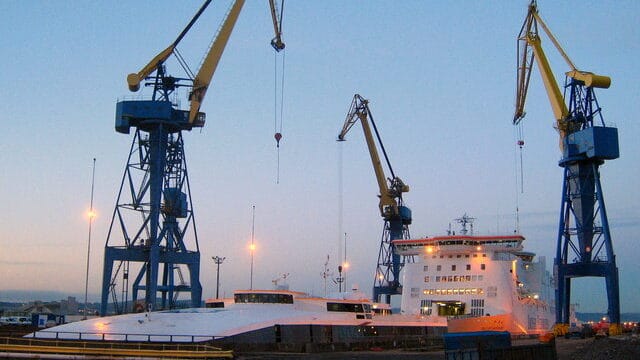
Titanic shipyard owner Harland & Wolff to enter administration

Harland & Wolff, the historic shipyard company known for building the Titanic, has announced that it is insolvent and expects to enter administration this week.
The troubled company, which operates four shipyards across the UK, stated that between 50 and 60 redundancies are anticipated immediately, primarily affecting staff based in London. However, workers at the shipyards in Belfast, Scotland (Methil and Arnish), and England (Appledore) will not be impacted, and the company assured that its core operations would “continue to trade as usual” during the administration process. Harland & Wolff employs around 1,600 people across its businesses, which include a proposed gas storage operation and previously a ferry service to the Isles of Scilly.
Harland & Wolff’s interim executive chair, accountant Russell Downs, acknowledged the company’s financial challenges in a statement, citing “significant historic losses” and the failure to secure long-term financing. Despite these difficulties, he said there has been “good progress” in finding potential buyers. Several parties, including Babcock International and Navantia, are reportedly considering bids for parts of the business. Downs adds that “extremely difficult decisions have had to be taken to preserve the future of our four yards.” Talks continue with investors, and Harland & Wolff has expressed optimism, stating, “There is a credible pathway to recovery for the group.”

The Irish Ferries-operated vessels Jonathan Swift and Isle of Inishmore, in dry dock at Harland and Wolff in Belfast. Image courtesy of Wikicommons/Ross.
Unions have expressed concern over the potential loss of jobs and disruption to local communities. Matt Roberts, national officer at the GMB union, criticised the situation in a media release, saying: “Workers, their families and whole communities now face their lives being thrown into chaos due to chronic failures in industrial strategy and corporate mismanagement.” He urged the government to prevent private companies from selectively saving certain contracts or yards. Similarly, Susan Fitzgerald, Irish regional secretary at Unite, called for government intervention to protect shipbuilding skills and employment if a suitable buyer is not found.
The UK government has reiterated that the firm’s administration will not affect core operations, including Ministry of Defence contracts. A £200m export development guarantee previously sought by the company was not approved due to concerns over taxpayer risk. Harland & Wolff has reportedly been in talks with potential investors, but no long-term funding solution has yet been secured.
The administration marks the second time in five years that Harland & Wolff has faced financial collapse. In 2019, the business was saved from closure by InfraStrata, an energy infrastructure firm, which purchased the company for £6 million. Since then, Harland & Wolff has struggled with strong competition, particularly from Asia, and a failure to find the necessary investment to modernise its facilities and expand its shipbuilding operations. Despite this, the company remains hopeful that its shipyards will be sold, preserving its core business.
"There's an awful lot on the line but I'm confident we can overcome our financial difficulties."
— BBC Radio 4 Today (@BBCr4today) September 17, 2024
Russell Downs, interim chairman of shipbuilders Harland & Wolff, speaks to #R4Today as it's confirmed the firm – whose Belfast shipyard built the Titanic – will enter administration. pic.twitter.com/hMpIB92K9G
The announcement comes as the future of Harland & Wolff’s role in building Royal Navy ships remains uncertain. The company had won a contract as part of a consortium with the Spanish shipbuilder Navantia to build three warships for the Royal Navy, but funding issues have raised doubts about whether the Belfast yard will be able to carry out the work. The situation underscores ongoing concerns about the sustainability of UK shipbuilding and the government’s ability to deliver on its promises to spread defence contracts beyond the dominant players in the sector, such as BAE Systems and Babcock International.
The post Titanic shipyard owner Harland & Wolff to enter administration appeared first on Marine Industry News.
